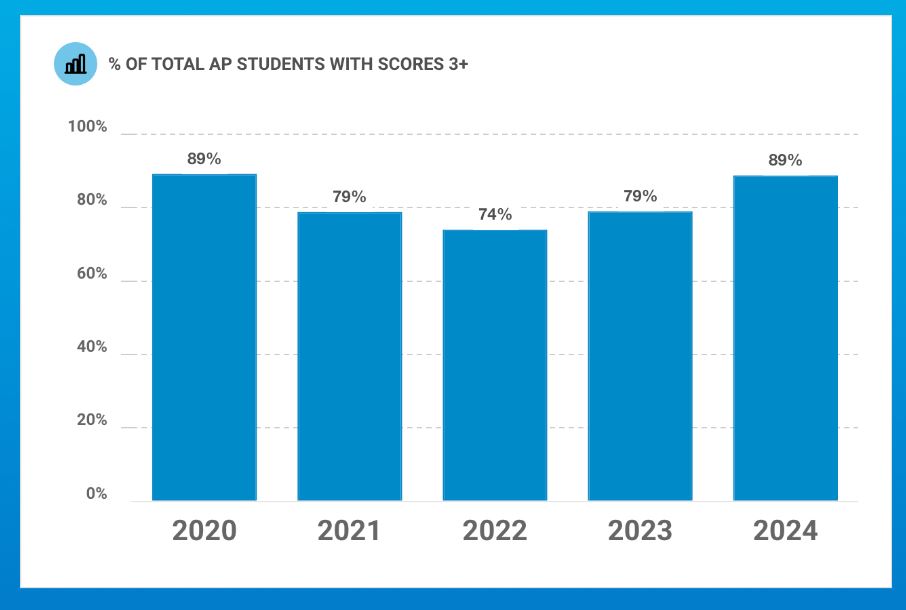At 8am on July 8, 2024, 294 Benjamin scholars logged in to the College Board website for validation of the hard work, sweat equity, and lost sleep associated with taking one of our ## AP courses. By 8:01, it was clear: once again, the Benjamin School outshined the norm.
With 88.78% of Benjamin exams scoring a 3 or higher, it appears that the Covid slump may finally be over; scores were roughly the same as they were in 2020. Specifically, 261 of 294 students who took an AP scored a 3 or above on at least one exam. In addition to the overall scores being higher in 2024 than 2022, there were 36 more students taking an AP and 88 more tests taken in total.

So we’re smarter, right? The answer is not so clear as College Board continued to recalibrate scoring rubrics this past exam cycle. The changes have altered scoring curves– usually increasing scores– in order to make the tests more realistic and fair, more closely reflective of the outcomes seen in the college courses the AP exams stand-in for.
Many are unsure to what exactly one should credit this new wave of 4s and 5s.: national scoring changes, institutional alterations to test preparation, responses to Instructional Planning Reports, or simply a more-capable set of test-takers.
Over the past two exam cycles, the College Board has recalibrated the scoring on 7 of its exams: English Lit, World History, Biology, Chemistry, European History, U.S. History, and U.S. Gov. The results are obvious: scores increased. Rates of 4 and 5 scores more than doubled in English Lit and Gov, with increases on the other exams preceding 10 percentages. More than 100,000 students earned a 3+ last year than the year before.
Upper School AP Coordinator Mrs. Hewitt looked to APUSH as an example. “From a global perspective, roughly 25 percent of US History exams received a 4 or 5 in 2023. In the 2024 cycle, the number increased to 46 percent (+21),” shared Hewitt.
The share of Benjamin School’s APUSH exams earning a 4 or 5 rose from 39 percent to 81 percent (+42) during the same time period.
“If you take that information and kind of extrapolate that to think about how our Benjamin students probably fared, then you could see that our students did very, very well,” noted Hewitt.
But perhaps our good scores actually were the result of some good work on campus. Consider the state of the US Economics program.
Social Studies teacher Mr. Graham Wik is constantly seeking to increase his student’s knowledge and engagement, and thus his classes’ scores. “One piece is that we did more as a school to ask the student to do more work in the spring to review. Because it’s one of the only one semester fall classes that we have, it is important to prepare later on,” says Mr. Wik.
Last year, the mean score on the AP Microeconomics exam increased from 3.36 to 3.67. As the test was not recalibrated, the improvement has to be attributed elsewhere.
While the social studies’ department’s changes stemmed in part from scheduling, in the English department sometimes change comes in response to the College Board’s Instructional Planning Reports. These documents are provided to teachers each spring, offering insight into the strengths and weaknesses of their classes.
When he was preparing to take over the AP Literature courses from a retiring Mr. Feyk a few years ago, Dr. Peruggia and he used the planning reports to discuss changes in texts and unit foci. “We have always had incredibly high expectations and results in our AP and non AP courses, so I knew there was likely little room for much improvement. Nonetheless, the reports hinted that we may have some space to grow in our analysis of poetry, so I seized on that. By adding more poetry to the curriculum, increasing the frequency of poem-based analyses, and striving to make poetry more understandable and enjoyable, our results in those subsections on the AP and SAT exams have risen even higher,” said Dr. Peruggia. “In some cases, its clearly made the difference between a 4 and a 5.”
While the faculty are always making effortful strides at keeping the AP program a success, AP students are the ones who are ultimately responsible for their AP scores. So, perhaps, the increase is simply reflective of a more-capable set of test-takers.
“If the Benjamin School is improving every year, we must be too. So we have to be smarter, more athletic, more diverse, and more prodigious than the grades before us and the people studying at other schools around us… it just makes sense. Better produces better,” reasoned Senior Jonathan Vidal.
Whether curved or earned, the Upper School’s AP scores were stellar last year. Will the digital transition further that trend?









